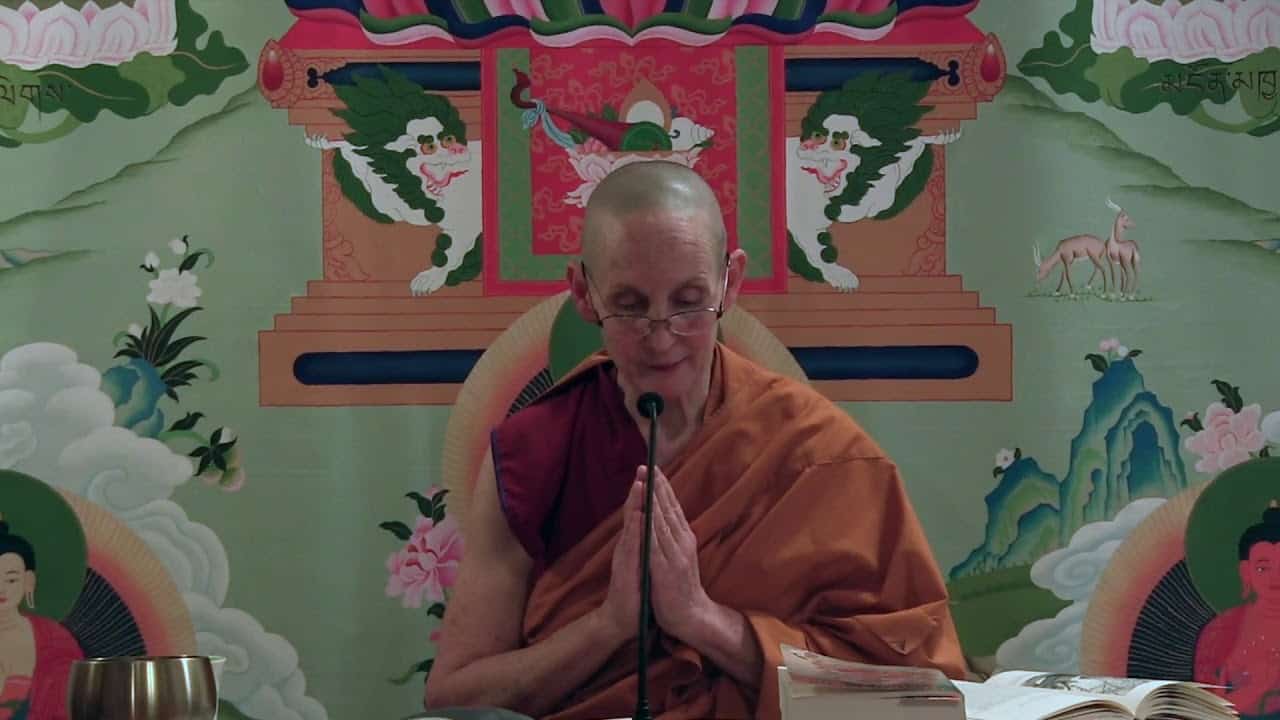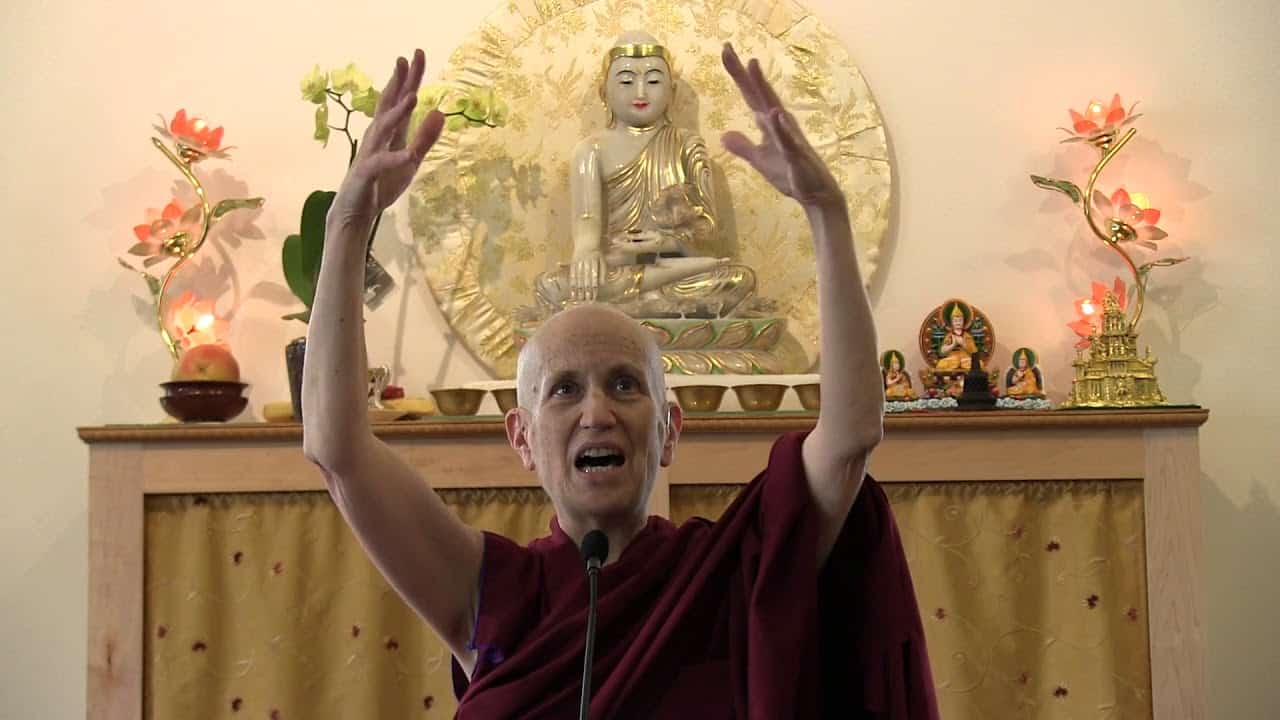Six conditions for serenity
The text turns to training the mind on the stages of the path of advanced level practitioners. Part of a series of teachings on the Gomchen Lamrim by Gomchen Ngawang Drakpa. Visit Gomchen Lamrim Study Guide for a full list of contemplation points for the series.
- Unsuitable versus appropriate motivations for cultivating concentration
- Five elements of a favorable environment for meditation
- Having little desire and developing contentment
- Giving up worldly activities and living in pure ethical conduct
- Having realistic expectations and using your present situation wisely
Gomchen Lamrim 120: Six Conditions for Serenity (download)
Contemplation points
- In the motivation, Venerable Tarpa said that because all our dukkha arises from the misperception of how things exist, the wisdom that realizes emptiness is the direct antidote. As a result, all the teachings of the Buddha prepare and lead us into attaining a realization of emptiness. Spend some time thinking about teachings at different stages of the path and consider how they lead to this wisdom.
- With that in mind, how does meditative stabilization facilitate wisdom?
- Even though you may not be able to attain serenity in this life, you can begin to build this skill. As Venerable Tarpa said, the drops in the bucket add up. How might cultivating the ability to concentrate in meditation, to whatever level you are able, benefit your practice now, on and off the cushion? How does it lead to having meditative stability at some point in the future?
- Consider the first of the six conditions to develop serenity: dwelling in an appropriate place.
- Why is this condition beneficial for cultivating serenity? What benefit does it provide?
- How do ease of access, good companionship, being able to attain supplies easily, etc. help to create an appropriate place for serenity meditation?
- To what extent have you already started setting up these kinds of conditions in your life? What has been the benefit of doing so?
- What obstacles arise keeping you from further cultivating this condition and what can you do to overcome them?
- Consider the second and third of the six conditions to develop serenity: having little desire and being content.
- Why are these conditions beneficial for cultivating serenity?
- Venerable Tarpa said this is about totally dedicating yourself to the spirit of attaining full awakening instead of sitting on the cushion daydreaming about how things could be better. To what extent do you see this kind of distraction in your meditation practice? What are the disadvantages of that?
- To what extent have you already started countering desire and cultivating contentment in your life and what benefits have you experienced as a result?
- What obstacles arise keeping you from further cultivating these conditions and what can you do to overcome them?
- Consider the fourth of the six conditions to develop serenity: completely giving up many activities.
- Venerable Tarpa said this is about abandoning certain activities while in retreat, like email, taking care of family, shopping, socializing, etc. Why is this condition beneficial for cultivating serenity? What benefit does it provide?
- To what extent have you already started abandoning or reducing certain activities in your life and what benefits have you experienced as a result?
- What obstacles arise keeping you from further cultivating this condition and what can you do to overcome them?
- Consider the fifth of the six conditions to develop serenity: pure ethical discipline.
- Why is this condition beneficial for cultivating serenity? What benefit does it provide?
- To what extent have you already started cultivating good ethical discipline in your life and what benefits have you experienced as a result?
- What obstacles arise keeping you from further cultivating this condition and what can you do to overcome them?
- Consider the sixth of the six conditions to develop serenity: completely getting rid of thoughts of desire.
- Why is this condition beneficial for cultivating serenity? What benefit does it provide?
- How does meditating on impermanence help to cultivate this condition?
- Venerable Tarpa said that because what we’re trying to do is progress through the form and formless realms (abandoning the desire realm), any worldly desire we cling to directly counters that goal, so it must be abandoned. Take some time to really consider this point.
- What obstacles arise keeping you from cultivating this condition and what can you do to overcome them?
- Why is it so important to be realistic about what you can achieve right now, remembering that even small efforts you make matter and contribute to getting you to your goal?
- Seeing the many benefits of cultivating meditative concentration, resolve to strengthen these six supportive conditions in your life.
Venerable Thubten Tarpa
Venerable Thubten Tarpa is an American practicing in the Tibetan tradition since 2000 when she took formal refuge. She has lived at Sravasti Abbey under the guidance of Venerable Thubten Chodron since May of 2005. She was the first person to ordain at Sravasti Abbey, taking her sramanerika and sikasamana ordinations with Venerable Chodron as her preceptor in 2006. See pictures of her ordination. Her other main teachers are H.H. Jigdal Dagchen Sakya and H.E. Dagmo Kusho. She has had the good fortune to receive teachings from some of Venerable Chodron's teachers as well. Before moving to Sravasti Abbey, Venerable Tarpa (then Jan Howell) worked as a Physical Therapist/Athletic Trainer for 30 years in colleges, hospital clinics, and private practice settings. In this career she had the opportunity to help patients and teach students and colleagues, which was very rewarding. She has B.S. degrees from Michigan State and University of Washington and an M.S. degree from the University of Oregon. She coordinates the Abbey's building projects. On December 20, 2008 Ven. Tarpa traveled to Hsi Lai Temple in Hacienda Heights California receiving bhikhshuni ordination. The temple is affiliated with Taiwan's Fo Guang Shan Buddhist order.


